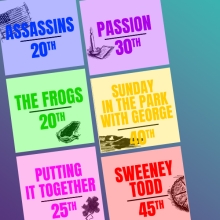
Full Synopsis
Act One
London, 1909. In the Prologue, we learn the nature of the evening's bill of fare ("A Warning to the Audience"). In a prison cell, Monty Navaro, the ninth Earl of Highhurst, takes up a pen to write his memoir: "In the event of my execution, while I still have time." His story begins in a shabby flat in Clapham, where he receives an unexpected visit from Miss Shingle, an old friend of his recently departed mother ("You're a D'Ysquith").
With the stunning discovery that he is eighth in line to inherit a magnificent title and fortune, Monty sends a letter to the head of the family, Lord Asquith D'Ysquith, Sr., asking for a job in the D'Ysquith banking house. He then rushes to tell the news to his childhood sweetheart, Sibella Hallward, arriving just as she prepares to go out ("I Don't Know What I'd Do"). Monty tells her that only eight other D'Ysquiths stand before him in the line of succession, which means that he could be Earl himself some day. "And pigs might fly!" Sibella laughs. "Eight people would have to die for that to happen! How likely is that?!" Sibella teases Monty about her forthcoming outing with Lionel Holland, who is not only rich and good looking, but drives a motorcar. Regardless, Monty kisses her impulsively and passionately. Although Sibella shares his ardor, she draws the line at a future together. Sibella is determined above all else to marry a man with wealth and influence.
A letter from Asquith D'Ysquith, Jr., rebuffs any notion that Monty will be recognized by the D'Ysquiths ("Foolish to Think"). Among a group of tourists who are led by an informative guide, Monty visits Highhurst Castle, ancestral home of the D'Ysquiths, where the family portraits seem to speak directly to him ("A Warning to Monty"). The imposing and perpetually aggravated Earl, Lord Asquith D'Ysquith, discovers Monty on the wrong side of the velvet rope and ejects him ("I Don't Understand the Poor").
Seeking an ally, Monty visits the Reverend Lord Ezekial D'Ysquith. While enthusiastic about the architectural splendor of his historic church, the doddering cleric shows Monty no sympathy. In his zeal to share the view, Ezekial steps too close to the tower's edge. When he reaches out for help, Monty hesistates ("Foolish to Think – Reprise") and lets the Reverend fall. In one moment, Monty's life has changed forever... and, of course, the action has been set.
Monty then follows the man who snubbed him so unmercifully, Asquith D'Ysquith, Jr., to a winter resort, where he finds the young dandy skating on the lake with Miss Barley, his chorus-girl mistress ("Poison in My Pocket"). Grief-stricken over the "accidental" loss of his only son, Lord Asquith D'Ysquith, Sr., offers Monty a job at the family banking firm. Flush with excitement over his acceptance by the D'Ysquiths at last, Monty hurries to tell Sibella – only to learn that she is engaged to Lionel Holland ("Poor Monty").
At a village inn, Monty rescues wealthy landowner, Henry D'Ysquith, from the fists of an angry tenant farmer. Grateful, Henry buys Monty a round ("Better with a Man") and invites him back to his country estate, where he reveals his passion for beekeeping. Over time, he assures Monty that one builds up a resistance to bee stings: "I dare say it would take a hundred bees to kill me now." When Monty returns the following weekend to set a trap, he meets Henry's lovely, innocent sister, Phoebe D'Ysquith, with whom he develops an instant rapport. As the two draw closer, Phoebe is unaware that her brother is being pursued by a swarm of bees ("Inside Out"). Monty is left to console Phoebe, and it occurs to him that should he achieve his goal of becoming Earl, "I could find no finer woman to be my countess."
Lady Hyacinth D'Ysquith, an unmarried society matron of a certain age, is furious that her latest charitable venture has been ruined by scandal. She and her colleagues are aided in their search for a new cause by a helpful "Baron Philpot" aka Monty ("Lady Hyacinth Abroad"). After reading of Lady Hyacinth's tragic death at the hands of cannibals in deepest, darkest Africa, Lord Asquith D'Ysquith, Sr., notes Monty's closeness to the succession. While maintaining an affair with the newly wed Sibella, and continuing to offer consolation to the mourning Phoebe, Monty disposes of the fitness-obsessed Major Lord Bartholomew D'Ysquith and the transcendently terrible actress, Lady Salome D'Ysquith Pumphrey, whose Hedda Gabler takes naturalism one pistol shot too far. Asquith Sr.'s, sudden heart attack leaves only Lord Adalbert as the obstacle between Monty and the Earldom ("The Last One You'd Expect").
Act Two
At Asquith D'Ysquith, Sr.'s, funeral, the mourners discreetly ask the question on everyone's mind ("Why Are All the D'Ysquiths Dying?"). At Highhurst, Lord Adalbert is preoccupied with the same question ("Why Are All the D'Ysquiths Dying? – Reprise"). After an assignation with Sibella at his bachelor apartment, Monty explains why he stares at her so intently ("Sibella"). With the unexpected arrival of Phoebe, Sibella hides in the bedroom while Monty desperately tries to keep the two women apart ("I've Decided to Marry You"). Monty accepts Phoebe's proposal, with Sibella none the wiser.
To celebrate their engagement, Monty escorts Phoebe to a weekend with Lord Adalbert and his combative countess, Lady Eugenia, at Highhurst Castle ("Final Warning"), where he discovers the inconvenient presence of Sibella, also a weekend guest. At dinner, Monty is shocked to see Miss Shingle and learn that she has been a servant at Highhurst for 39 years. Monty realizes that this may be his only chance to complete his mission ("Poison in My Pocket – Reprise") but he is foiled in his attempt. With his relatives dropping like flies, Lord Adalbert relives his near-death experience in the Boer War ("Looking down the Barrel of a Gun") and collapses unexpectedly.
At the death of Lord Adalbert, Monty becomes the Ninth Earl of Highhurst. His triumph is short-lived, however, when, at his wedding to Phoebe, an Inspector from Scotland Yard arrests Monty for murder ("Stop! Wait! What?!"). At trial, Monty vehemently denies poisoning Lord Aldabert's port, but the circumstantial evidence is damning. Back in his prison cell on the eve of the verdict, Monty is astonished to discover that the unassuming janitor, Chauncey, is also a D'Ysquith. Phoebe visits Monty in his cell, and he tries his best to console her. She has but one question: "That woman, Mrs. Holland – is she in love with you?" Monty hesitates, which is all the answer that Phoebe needs.
That night, Sibella pays a surprise call on the Inspector while a Magistrate receives an unexpected visit from Phoebe ("That Horrible Woman"). With seemingly irrefutable evidence, the women each accuse the other of Lord Adalbert's murder, making it impossible for either of them – or Monty – to be charged. Monty is awakened by the news that he is being set free. As he emerges from prison, Monty is greeted by the secret conspirators, Sibella and Phoebe. Monty Navaro has finally triumphed at last... or has he? ("Finale")
Show History
Inspiration
A Gentleman's Guide to Love and Murder is a musical comedy with a book by Robert L. Freedman, music by Steven Lutvak and lyrics by both men. It is based on the novel, Israel Rank: The Autobiography of a Criminal by Roy Horniman, a comedic work published in 1907 that depicted the journey of one man through a slew of murders. The novel is also the basis of the 1949 British black comedy film, Kind Hearts and Coronets, which has been listed in TIME Magazine's top 100 British films. Both the film and the musical utilize the same technique of using one actor to play all eight members of the main dying family tree (D'Ascoyne in the film, D'Ysquith in the musical).
Productions
A Gentleman's Guide to Love and Murder premiered at the Hartford Stage theatre company in Hartford, Connecticut, in October 2012. The production starred Jefferson Mays, Ken Barnett and Lisa O'Hare. The production then moved west for a run at the Old Globe Theatre in San Diego, California, in March 2013. On November 17, 2013, the musical opened on Broadway at the Walter Kerr Theatre. Mays and O'Hare continued their roles, and Bryce Pinkham and Lauren Worsham were added to the cast.
Cultural Influence
A Gentleman's Guide to Love and Murder has been heralded as the first period-piece musical and pseudo-operetta since The Mystery of Edwin Drood in the 1980s.
Trivia
The Broadway production of A Gentleman's Guide to Love and Murder was nominated for ten Tony Awards, including Best Musical, Best Book of a Musical, Best Original Score and Best Direction of a Musical. It was also nominated for twelve Drama Desk Awards (including Outstanding Musical, Book of a Musical, Music, Lyrics and Director of a Musical), eleven Outer Critics Circle Awards (including Outstanding New Broadway Musical, Book of a Musical, New Score, Director of a Musical and Choreographer), and two Drama League Awards (including Distinguished Production of a Musical).
Critical Reaction
"Please give a hearty welcome to Monty Navarro, the conniving killer who helps turn murder most foul into entertainment most merry.... Despite the high body count, this delightful show will lift the hearts of all those who've been pining for what sometimes seems a lost art form: musicals that match streams of memorable melody with fizzily witty turns of phrase. ...Mr. Lutvak and Mr. Freedman may be reworking forms that have been previously established, primarily the patter song and the romantic ballad. But their score still establishes itself as one of the most accomplished (and probably the most literate) to be heard on Broadway in the past dozen years or so."
– The New York Times
"Adorably wicked.... Although the naughty lyrics are the sweetest of the show's bitter treats, Steven Lutvak's music invites its own independent smiles. Buffed to a shine by Jonathan Tunick's orchestrations and played by a splendid pit orchestra, these lethal ditties are a pastiche of everything the English musical theater holds dear, from Noel Coward to Gilbert and Sullivan."
– Variety
"The new undisputed king of musical comedy. Filled with lunatic sight gags and the wittiest, loveliest show tunes in years. [...Lutvak and Freedman's] songs, too organic and surprising to be dismissed as pastiche, assimilate influences from Gilbert and Sullivan, Sondheim and English music hall. They range from broadly satiric "I Don't Understand the Poor" to the campy "Better with a Man" and the brilliantly constructed operatta-ish trio "I've Decided to Marry You.'"
– TimeOut New York
"Thoroughly delightful and uproarious. ...This production's secret weapon isn't the poison in Monty's pocket but Lutvak's jaunty score, which sounds both fresh and period-perfect with its echoes of Gilbert and Sullivan and classic British music hall. And the lyrics are as gut-bustingly clever as anything in The Book of Mormon. ...No one is likely to get sick of the black comedy in A Gentleman's Guide to Love and Murder, which remains winsome and charming despite an alarming surfeit of devious and devilish characters. Quite simply, it's a bloody good time."
– Entertainment Weekly
"It glitters like gold!"
– The Wall Street Journal
"Hilarious satire on Edwardian melodrama. ...The farcical vaudevillian tour de force features a book by Robert L. Freedman, rousing music by Steven Lutvak, and wry, wonderful lyrics by Freedman and Lutvak that call to mind the light-hearted puns and wit of Noel Coward."
– The Associated Press
"Propelled by a rollicking story, humor of the most delectable amorality and the cleverest lyrics assembled in quite some time."
– The Hollywood Reporter
"An extremely clever, exquisitely staged send-up of Edwardian England, with a heady pastiche score. ...The songs evoke a range of influences, from the British music hall to Noel Coward to Gilbert and Sullivan, accompanied by dialogue that at times suggests Oscar Wilde."
– The Record
"Exquisitely constructed.... Clever, charming, inspired - all of the above. ...A Gentleman's Guide to Love and Murder could easily serve as a primer itself on how to put on an intelligent crowd-pleaser with supreme wit and ingenuity."
– NY1
"[A] perfectly picaresque little piece of faux-Edwardian stuff and nonsense. Featuring a droll book by Robert L. Freedman and a chirpy score by Steven Lutvak (the two share credit for the lyrics), this show proves once again how the lovable serial killer is a type whose appeal hardly is limited to premium cable."
– The Chicago Tribune
"I've never laughed so hard at a Broadway musical! ...This is something we don't really see on Broadway anymore. There's a new surprise at every turn!"
– NPR
"The composing team has provided an abundant score that reflects any number of influences, from European opera to Gilbert and Sullivan to hints of Romberg, along with elaborate lyrics that are just as funny and inventive as the musical's plot and physical comedy. ...A Gentleman's Guide to Love and Murder is polished, professional and everything that one could expect from a Broadway show."
– The Examiner
"The music for "Gentleman's Guide" gives continual pleasure. Composer Steven Lutvak brilliantly tips the top hat to Gilbert and Sullivan in patter pieces, and, in the show's several waltzes, gives a smiling nod to Viennese operetta ... in the end, everything sounds remarkably fresh, thanks to how the lyrics - Lutvak and Freedman share the credit for those - effortlessly serve the music, and vice versa."
–The Baltimore Sun
Connect
Billing
- Book and Lyrics by
- Music and Lyrics by
Based on the novel, Israel Rank by Roy Horniman
Requirements
|
Book and Lyrics by
ROBERT L. FREEDMAN
(50%)
|
Music and Lyrics by
STEVEN LUTVAK
(50%)
|
Joey Parnes, Sue Wagner, John Johnson,
50 Church Street Productions, Joan Raffe & Jhett Tolentino, Jay Alix & Una Jackman,
Catherine & Fred Adler, Rhoda Herrick, Kathleen K. Johnson, Megan Savage,
ShadowCatcher Entertainment, Ron Simons, True Love Productions, Jamie deRoy,
Four Ladies & One Gent, John Arthur Pinckard, Greg Nobile, Stewart Lane & Bonnie Comley
Exeter Capital/Ted Snowdon, Ryan Hugh Mackey, Cricket-CTM Media/Mano-Horn Productions,
Dennis Grimaldi/Margot Astrachan, Hello Entertainment/Jamie Bendell
Michael T. Cohen/Joe Sirola, Joseph & Carson Gleberman/William Megevick
and
Green State Productions
In association with
The Hartford Stage and The Old Globe”
Vocal Arrangements by Dianne Adams McDowell & Steven Lutvak
Video Warning
In accordance with the Performance License, you MUST include the following warning in all programs and in a pre-show announcement:ANY VIDEO AND/OR AUDIO RECORDING OF THIS PRODUCTION IS STRICTLY PROHIBITED.
If you purchase a video license to allow non-commercial video recording of this production, then you MUST include the following warning in all programs and in a pre-show announcement:
ANY VIDEO RECORDING MADE OF THIS PERFORMANCE IS AUTHORIZED FOR PERSONAL, AT-HOME, NON-COMMERCIAL USE ONLY. THE SALE OR DISTRIBUTION OF SUCH RECORDING IS STRICTLY PROHIBITED UNDER FEDERAL COPYRIGHT LAW.
Included Materials
| Item | Quantity Included |
|---|---|
| LIBRETTO/VOCAL BOOK | 15 |
| PIANO CONDUCTOR'S SCORE | 1 |
| PIANO VOCAL SCORE | 1 |
Production Resources
| Resource |
|---|
STANDARD ORCHESTRATION
| Instrumentation | Doubling |
|---|---|
| BASS | |
| CELLO | |
| HORN | |
| PERCUSSION | AFRICAN DRUM , BELL TREE , CHIMES , DRUM SET , FINGER CYMBALS , GLOCKENSPIEL , TAM TAM , TIMPANI , TRIANGLE , WOOD BLOCK , XYLOPHONE |
| REED 1 | CLARINET IN A , CLARINET IN B FLAT |
| REED 2 | ENGLISH HORN , OBOE |
| REED 3 | |
| TRUMPET | |
| VIOLA | |
| VIOLIN | |
| VIOLIN 2 |




